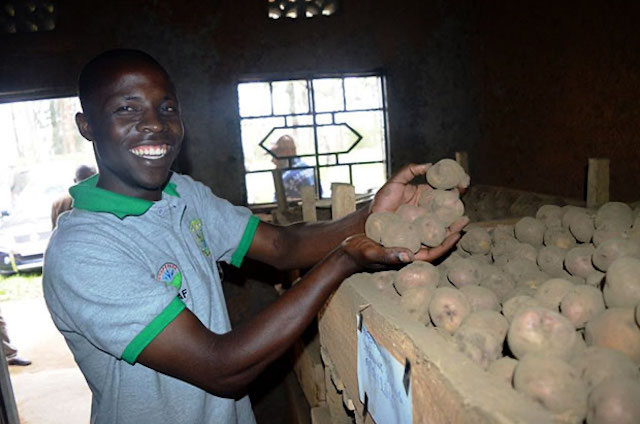Overcoming Obstacles to Business in Africa
The Economist examines the opportunities and obstacles for enterprising people in Africa – and highlights TechnoServe’s work to bolster young entrepreneurs.

Creativity and energy are in no short supply among the 12 young members of the Icyerekezo Cooperative in Kinigi, Rwanda. After soaking up business training as part of the STRYDE program – a partnership between TechnoServe and the MasterCard Foundation – the 20-something group of men and women decided to form a cooperative to produce and sell improved seeds for potatoes.
Many of the members of Icyerekezo Cooperative, formerly called AVEN, are using the income from the seed business, and the entrepreneurship skills they acquired through STRYDE, to run their own small businesses on the side. Emmanuel Bunani grows garlic, for example, and has hired five people to keep up with buyer demand.
The success of young enterprising people like Emmanuel raises some questions, according to the Economist, who recently featured TechnoServe’s work in an article examining Africa’s untapped opportunities. “If it is really so easy to make money growing garlic… why aren’t more people doing it? And how can more people be encouraged to do so?”
The STRYDE participants are just some of the many Africans who are eager to apply their diligence and innovation to earn a sustainable income. In fact, out of necessity, people in Africa are far more likely to be self-employed than people in more developed countries.
Yet, due to obstacles in accessing finance, markets and skilled workers, the region continues to see low numbers of formal small businesses.
I knew it could be a good business because I had seen others doing it, but I didn’t know where to start.”
– Thacienne Ahunkuye, STRYDE participant
As the Economist points out, many banks in Africa don’t have the capacity to measure and manage risk of lending to small businesses, and even if entrepreneurs are able to get a loan, interest rates can be prohibitive. Meanwhile, poor infrastructure makes it difficult to access external markets. And a dearth of existing successful businesses mean that entrepreneurs lack social networks for advice and mentoring.
Thacienne Ahunkuye, 26, had been unemployed for four years before she enrolled in the STRYDE program and decided to launch an egg farm. “I knew it could be a good business because I had seen others doing it, but I didn’t know where to start,” she told the Economist. Thacienne now earns $300 to $400 a month from her egg farm, well above Rwanda’s average monthly income of $60.
The opportunities for African businesses are ripe. Initiatives like STRYDE can help African entrepreneurs overcome the challenging entrepreneurial landscape to get their businesses off the ground.



